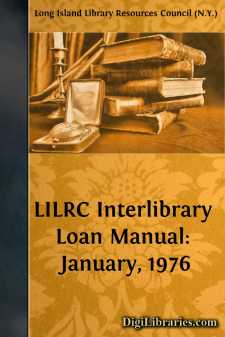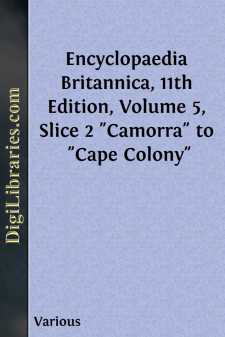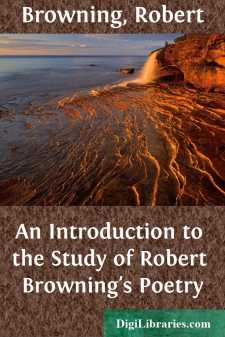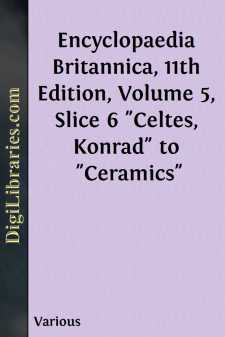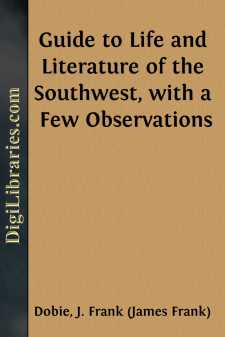Reference
- Atlases 1
- Bibliographies & Indexes 10
- Catalogs 55
- Dictionaries 1
- Encyclopedias 43
- Etiquette 14
- Handbooks & Manuals 19
- Heraldry 2
- Quotations 9
Reference Books
Sort by:
INTERLIBRARY LOAN POLICIES AND PROCEDURES Our interlibrary loan program is based on the premise that lending among libraries for the benefit of individuals in Nassau and Suffolk counties is in the public interest and should be encouraged. It is impossible for any one library to be self-sufficient, and interlibrary borrowing and lending is regarded by the libraries participating in this program as...
more...
by:
Various
CAMORRA, a secret society of Naples associated with robbery, blackmail and murder. The origin of the name is doubtful. Probably both the word and the association were introduced into Naples by Spaniards. There is a Spanish word camorra (a quarrel), and similar societies seem to have existed in Spain long before the appearance of the Camorra in Naples. It was in 1820 that the society first became...
more...
by:
Various
EDWARDES, SIR HERBERT BENJAMIN (1819-1868), English soldier-statesman in India, was born at Frodesley in Shropshire on the 12th of November 1819. His father was Benjamin Edwardes, rector of Frodesley, and his grandfather Sir John Edwardes, baronet, eighth holder of a title conferred on one of his ancestors by Charles I. in 1644. He was educated at a private school and at King’s College, London....
more...
by:
Various
DODWELL, EDWARD (1767-1832), English traveller and writer on archaeology. He belonged to the same family as Henry Dodwell the theologian, and was educated at Trinity College, Cambridge. He travelled from 1801 to 1806 in Greece, and spent the rest of his life for the most part in Italy, at Naples and Rome. He died at Rome on the 13th of May 1832, from the effects of an illness contracted in 1830 during...
more...
by:
Walter Cox Green
ADDRESSING ENVELOPES. MEN. A man should be addressed as Mr. James J, Wilson, or James J. Wilson, Esq. Either the Mr. or the Esq. may be used, but not the two together. The title belonging to a man should be given. It is not customary to use Mr. or Esq. when Jr. or Sr. is used. WOMEN. A woman's name should always have the Miss or Mrs. A woman should never be given her...
more...
by:
Louis Klopsch
Many Thoughts of Many Minds. Ability.—No man is without some quality, by the due application of which he might deserve well of the world; and whoever he be that has but little in his power should be in haste to do that little, lest he be confounded with him that can do nothing.—Dr. Johnson. We judge ourselves by what we feel capable of doing, while others judge us by what we have already...
more...
by:
Various
(Lat. _conventio_, an assembly or agreement, from _convenire_, to come together), a meeting or assembly; an agreement between parties; a general agreement on which is based some custom, institution, rule of behaviour or taste, or canon of art; hence extended to the abuse of such an agreement, whereby the rules based upon it become lifeless and artificial. The word is of some interest historically and...
more...
by:
Robert Browning
My dear Dr. Corson, I waited some days after the arrival of your Book and Letter, thinking I might be able to say more of my sense of your goodness: but I can do no more now than a week ago. You "hope I shall not find too much to disapprove of": what I ought to protest against, is "a load to sink a navy—too much honor": how can I put aside your generosity, as if cold justice—however...
more...
by:
Various
CELTES, KONRAD (1459-1508), German humanist and Latin poet, the son of a vintner named Pickel (of which Celtes is the Greek translation), was born at Wipfeld near Schweinfurt. He early ran away from home to avoid being set to his father’s trade, and at Heidelberg was lucky enough to find a generous patron in Johann von Dalberg and a teacher in Agricola. After the death of the latter (1485) Celtes led...
more...
A Preface With Some Revised Ideas IT HAS BEEN ten years since I wrote the prefatory "Declaration" to this now enlarged and altered book. Not to my generation alone have many things receded during that decade. To the intelligent young as well as to the intelligent elderly, efforts in the present atmosphere to opiate the public with mere pictures of frontier enterprise have a ghastly unreality....
more...


